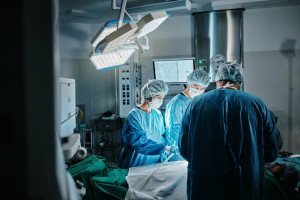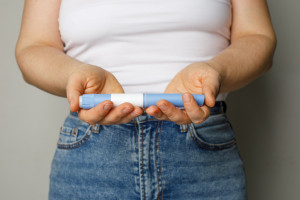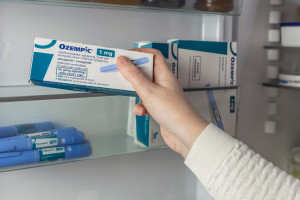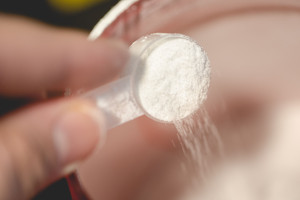Doda's "Jelly for Thyroid" is one of 190 thousand supplements. 80 percent nobody has tested

- Already 40% of Poles take supplements daily, and 35% use several types at the same time. Not only drug manufacturers are starting to sell their products in the form of supplements. Celebrities are also entering the market
- Dorota Rabczewska's example shows how easy it is to introduce supplements, even if you have little idea of what they are and how they work.
- Supplements do not undergo testing before being introduced to the market for the first time. A report to the Chief Sanitary Inspectorate is enough. Then they are checked randomly
- Experts emphasize that with a well-balanced diet, supplements are unnecessary for the vast majority of us. However, so-called pathosupplementation is flourishing. Adults, for example, take vitamin D intended for horses, and small children are given melatonin
- At the moment, we have 190 thousand dietary supplements in the public register of GIS. Only 20% of them have been verified in any way
Dorota Rabczewska, or Doda, has gone beyond show business and has also started selling dietary supplements. The way she promotes them, presenting the products as an effective remedy in the fight against Hashimoto's disease, raises doubts among many doctors, pharmacists, and dieticians. The composition of the jellies includes iodine, selenium, and vitamin D3.
- Hashimoto's disease cannot be cured with supplements, because supplements, by definition, cannot be used for treatment at all (...) It is impossible by definition - reminds Dr. Szymon Suwała, an endocrinologist.
Doda's case is of course a very small part of the whole machine of production, promotion and sale of dietary supplements. In discussions, it is often mentioned that they do not undergo any tests before being introduced to the market for the first time. But there are more problems. Together with experts, we looked at how the supplement business currently functions in Poland*.
- Dietary supplements are often confused with medicines - due to their form and place of sale. In the meantime, it is a food product that is intended to supplement our diet, not to treat - emphasizes Anna Wawer , head of the Department of Dietary Supplements, Fortified Foods and New Foods of the Chief Sanitary Inspectorate.
He admits that in order to introduce a product into circulation, it is enough to notify the sanitary-epidemiological station, which keeps a special register, about this intention.
- At the moment, we have 190 thousand products in the public register . There are approximately 20 thousand new reports per year. Of these 190 thousand, we have verified about 20 percent - Anna Wawer tells us.
- Does GIS even check whether the composition declared by the manufacturer is consistent with the actual composition? - we ask.
- In Poland, or in any other European Union country, dietary supplements are not tested before they are introduced to the market - the GIS representative repeats. - Let's not forget that this is food. Bread is not tested either - she points out.
Samples are randomly taken and tested for the content of metals hazardous to food, mycotoxins, microbiological and biological contaminants.
- The manufacturer is responsible for the supplement only until the patient puts it in their mouth. A dietary supplement does not have the same tests as a medicine. There can be 1000 mg of vitamin C, of which not even one percent is absorbed - says Prof. Jarosław Woroń , head of the Department of Clinical Pharmacology at the Department of Pharmacology, Collegium Medicum of the Jagiellonian University in Krakow.
We consume supplements more often than sweets. "The threat is enormous"Already 40% of Poles take supplements every day, and 35% use several types at the same time. We swallow them more often than so-called candies - based on available studies, about one fourth of Poles reach for sweets every day. "Supplement" could probably be a strong candidate for the youth word of the year . In the media, we can read, for example, that Bryan Johnson - a technology entrepreneur from Los Angeles, swallows 111 pills every day to stop aging.
- The threat is enormous, because dietary supplements interact with many drugs - says Prof. Jarosław Woroń . - Let's remember that people die in Poland as a result of drug and dietary supplement interactions, and we have hard evidence for that - he points out.
He mentions supplements containing ashwagandha, which are recommended - oh my - for patients with neuropathic pain, "and these are supplements that beautifully accelerate neuropathic pain and unfortunately the suffering of patients is later irreversible."
- Let's remember that supplements can participate in the so-called invalidation of patients - he warns.
Another example given by the professor is the belief in the beneficial effects of milk thistle and supplements, as well as medicinal products that contain it. - This is a huge misconception, because milk thistle can damage the liver - he points out.
In turn, cranberry - due to interactions - may increase the risk of bleeding after oral anticoagulants and antiplatelet drugs.
- Most often, we are dealing with the so-called consumer-patient, who, in addition to dietary supplements, takes pharmacotherapy . Throughout Europe, there is a problem with the "3W population", i.e. age, multi-morbidity, multi-medication - he sums up. As noted by Prof. Woroń, Poland was the only country where liver damage due to vitamin A overdose was recorded in 2024.
According to the pharmacologist, there is no point in taking multivitamin and mineral preparations, "because nature did not invent something like that."
Poles drink a bucket of spirits a year. They want to be healthy, but live unhealthyCan we say with certainty that supplements - with proper nutrition and lifestyle - are completely unnecessary?
- If the diet is wholesome, then yes. A very small percentage of the population needs supplementation - admits Dr. Daniel Śliż , assistant professor at the 3rd Department of Internal Medicine and Cardiology of the Medical University of Warsaw and president of the Polish Society of Lifestyle Medicine.
As he points out, however, we have more than half of the population who are overweight and 70% of citizens who are not physically active.
- We have alcohol consumption at the level of a bucket of spirit per Pole per year . 11 liters means nothing to anyone, and a bucket is a specific volume. And in such a situation, a Pole asks what he can do for his health. He turns on the internet, television and sees that if he takes a pill, he will be able to eat pork knuckle and drink Polish vodka or French wine - Dr. Śliż describes the reasoning of many citizens.
He says that supplements, which are becoming a "panacea for all evil", are seriously damaging health education in Poland.
- They certainly won't replace lifestyle - a healthy diet, no alcohol, no smoking, being physically active . They won't replace sleep and relationships - he enumerates.
Krzysztof Kurowski , Director of Strategic R&D Projects at Polpharma, Vice President of the Polpharma Scientific Foundation, we ask whether, similarly to medicines, we have the phenomenon of polypharmacy in relation to supplements, i.e. undesirable effects when taking several preparations at the same time.
- Absolutely, also in this category. Supplements can interact with each other, but also supplements versus drugs, supplements versus other product registration categories - he admits. What's more, such interactions can occur even within a single supplement, e.g. so-called multivitamins.
However, he emphasizes that supplementation definitely makes sense and is very necessary in some groups. He mentions people on the so-called elimination diet, vegetarians, vegans. - We have newborns, small children up to two or three years of age. They also need supplementation of some vitamins. Finally, we have pregnant women or those preparing for pregnancy. Today, there are standards that they should use folates and folic acid - he enumerates.
If we must, let's supplement wiselyWhat can a client who does not want to expose themselves to the dangers of supplementation really do? As experts point out, it is first and foremost worth consulting a doctor, dietician, pharmacist, and doing the appropriate tests. The problem, however, is that for most people this is too much effort.
- When it comes to quality verification by consumers, they should first and foremost buy products from reliable sources - this could be a pharmacy. Another path where you can check whether a given product is legally traded could be to verify whether it is in the GIS register - suggests Anna Wawer.
Interestingly, we were unable to find supplements offered by Dorota Rabczewska in the given register. We will contact GIS for clarification.
Anna Wawer also advises... reading the manufacturers' labels to verify the composition, e.g. in terms of possible side effects with medications. However, there is another problem here.
- If a patient taking medication and dietary supplements experiences an adverse reaction, what is discontinued? The medication, not the supplement - notes Prof. Woroń. The supplement may be "guilty" though.
- The market for medicinal products has regulated itself. The market for medical devices has also been subject to very large, new regulations in recent years. Although the word deregulation has been trendy recently, I think it is time for the opposite process in the case of dietary supplements - concludes Krzysztof Kurowski.
In his opinion, manufacturers should present simplified documentation regarding the composition. He also believes that for the consumer, a pharmaceutical company that produces both drugs and supplements is safer - because it maintains similar standards.
- We can't wade into paranoia, check registers and many other things. We should be sure that if something appears in legal circulation, it is safe - says Prof. Woroń.
* The text was based on a conversation with experts that took place on March 13 during the Health Challenge Congress (HCC) in Katowice.
Copyrighted material - reprint rules are specified in the regulations .
rynekzdrowia















